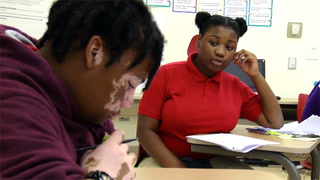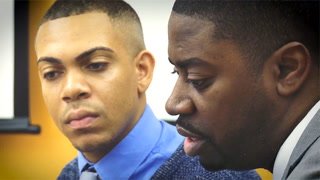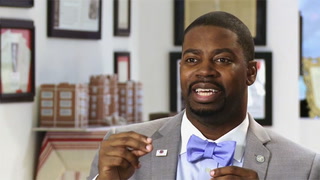Coaching for Equity Transcript
Speaker 1: As you go through this and work this out, I want you to underline your evidence.
Speaker 2: Coaching for equity is about helping teachers see everyone and giving them the tools to reach everyone. When you're coaching teachers for equity and you're asking them to teach, and help, and hold students to the standard, that doesn't mean you provide them access without adequate supports. It doesn't mean you tell or coach a teacher to help students access this complex text like they're reading War and Peace. Equity isn't everybody gets a copy because everybody deserves to read it. Equity is as a teacher, I have been empowered by my coach through specific instruction to make sure War and Peace makes sense for students that are from this side of Ward 5. That our students from this side of the city, this side of the tracks, because I've done the scaffolding to get them there. Now everybody has a piece of War and Peace, because the way that I have set them up to learn that's really germane to who they are as a person. Coaching for Equity is about not just providing access, providing access and support in ways that are important and fit each child.
In order to coach for equity, you need to almost do a roundabout. We want to focus on equity, but we want to focus on the important of being a practitioner and a professional. If we focus on being a practitioner and a professional, we will get to equity as a part of practice, not a part of theory and philosophy and beliefs. Where I think sometimes we get it wrong is equity, is we focus on the moral rectitude of it. It certainly is a moral imperative, but what's most important is that a teacher is a professional. If a teacher is a professional and an expert in practice, then they are in addition to the equity work going to reach all the students.
Growing up in Prince George's County, Maryland, and even going to college I would see that one of the chief problems of African American males and also other underserved populations is there's not guidance. There aren't a lot of teachers that look like that me, and there's not a lot of teachers that are able to sit down, and take the time that it takes to help me learn what I need to learn to become really a well-rounded citizen. I wanted to get into education, and specifically into leadership in education to help teachers unpack that for whoever walks in their room. They might have a me walking in their room, so I want them to be prepared to address me, to help me, to like me. Then to help me become the best version of myself.
I see that through my work. My work is not just about helping teachers become better, but it's about helping teachers nurture the next geniuses that could be in our world. The next people that can solve problems. Seeing everybody as a potential problem solver I think is a really key factor of coaching for equity.
If you're thinking about coaching for equity, I think you have to look at who's in the room. The first idea is when you are scripting and also when you're looking at student results, you may have to say demographically speaking, depending on what school you're in, by gender, by race, how are they doing on this objective. Who had their hands up and who didn't? Who was speaking? My good colleague, [Shanna Peeples 00:03:47], [NASH 00:03:47] teacher of the year said that the person doing the talking is the person doing the learning. That's one approach to it.
Also, if you're coaching for equity and looking for a starting point, you might want to think about what is the conversation that will promote them having students reach the standards. Here's what I mean. If you're coaching for equity and helping students reach standards, you want to develop expertise in the teachers themselves. One of the ways to do that is help them become experts in the standard and in the text that they're reading and studying. If they know the standards and they know the text, they can better [sight 00:04:23] with any student in the classroom whether they're hitting the mark or not hitting the mark with quickness and with alacrity and then they can reach those needs.
Coaching for equity is about developing expertise in the content pedagogy, but it's also about understanding who's talking, who's in the room, and who is getting the instruction that they need.













14 Comments
Jennifer Lopez Nov 18, 2020 1:30am
Coaching for equity does bring to mind the fact that this (equity in education) is easier said than done. It is very easy to push for students to have access to the same materials and resources and easy to forget that they as well as educators need the support in order to achieve this. It is important, now more than ever, that teachers are seeing all their students and being able t o teach according to their needs.
Michael Burnett Jun 13, 2020 10:35am
There are two parts to defining coach for equity: 1) help teachers see everyone, 2) giving the teacher the tools to reach everyone.
He focuses on empowering teachers to get to access and support to reach each child. He describes it as a round about that focuses on the importance of being a practicioner and professional rather than the moral side of it. Essentially if a teacher is a professional practicioner then they will reach all the students.
Equity is important to reach all students, especially those from disadvantaged backgrounds.
Hamida Ayubi Nov 12, 2019 8:12pm
I'm really interesting in bringing about not just equality but equity into the classroom, so I'm really thankful I found this video. There is a difference between equality and equity that sometimes people will dismiss and assume that they are the same thing, but in this video you did a great job of explaining that difference. Advice that was given in this video that really stuck out to me was "seeing everyone as a problem solver". It makes sense and it is a valid point to make, but of course sometimes we need to hear this again a reminder to remember that all the students are problem solvers. It may not be in the way that is expecting or by the standards, but if you give the student enough attention, you will be able to see how their mind work and how they solve problems. With this better understanding of the student, you can bring in tools that can help bring about equity and support the child when it comes to learning (espeically content standards).
Matthew Malvido Apr 25, 2019 10:30am
Thank you for sharing this video! As someone interested in teaching mathematics, I believe that the classroom tends to be structured in a way in which, if one student understands the material, it's assumed that most students can understand the material. Having equity in the classroom is crucial for students, as not everyone is able to have the same opportunities and/or resources outside of the classroom, so to be able to provide said opportunities/resources to allow the information to reach all students in an equal manner is quite powerful.
Dorinda Nusum Jan 15, 2018 7:14pm